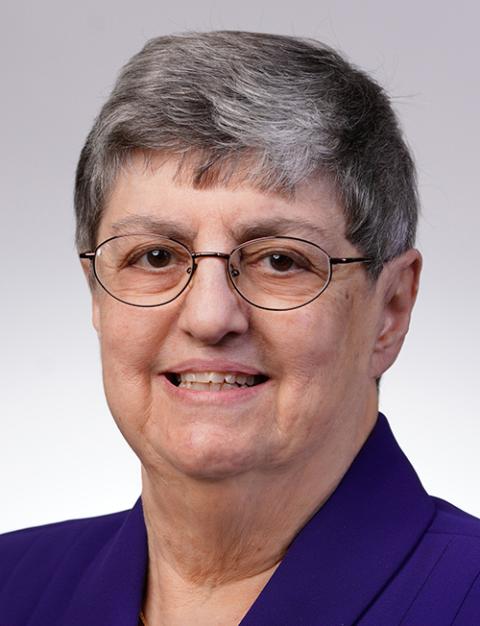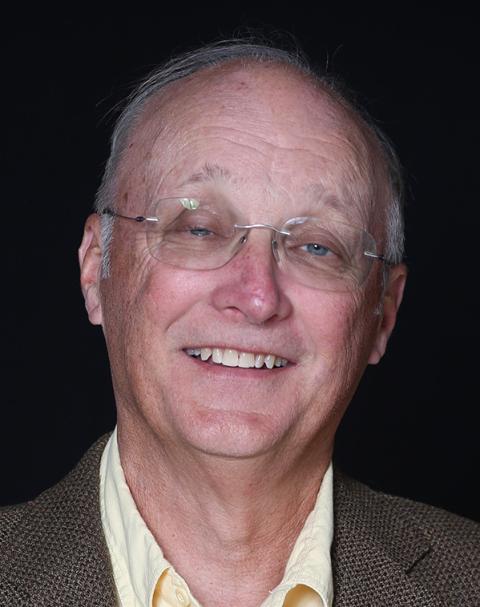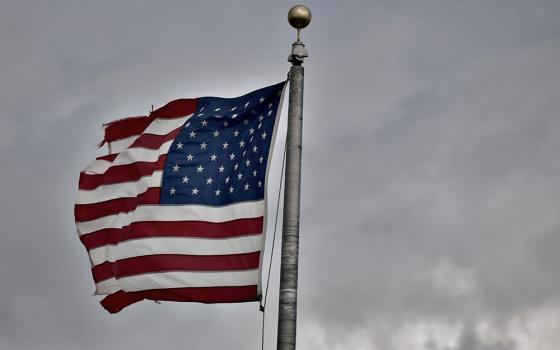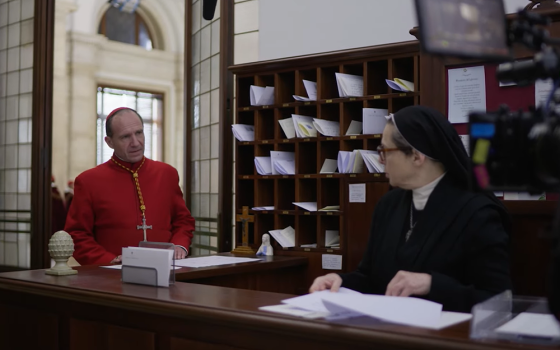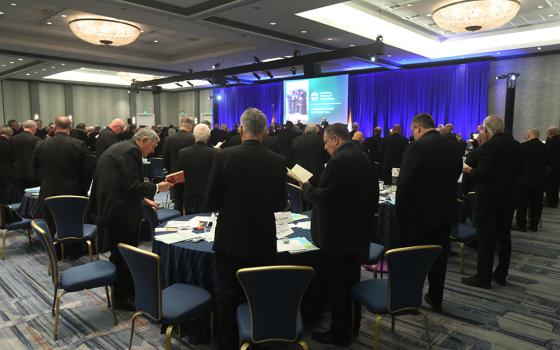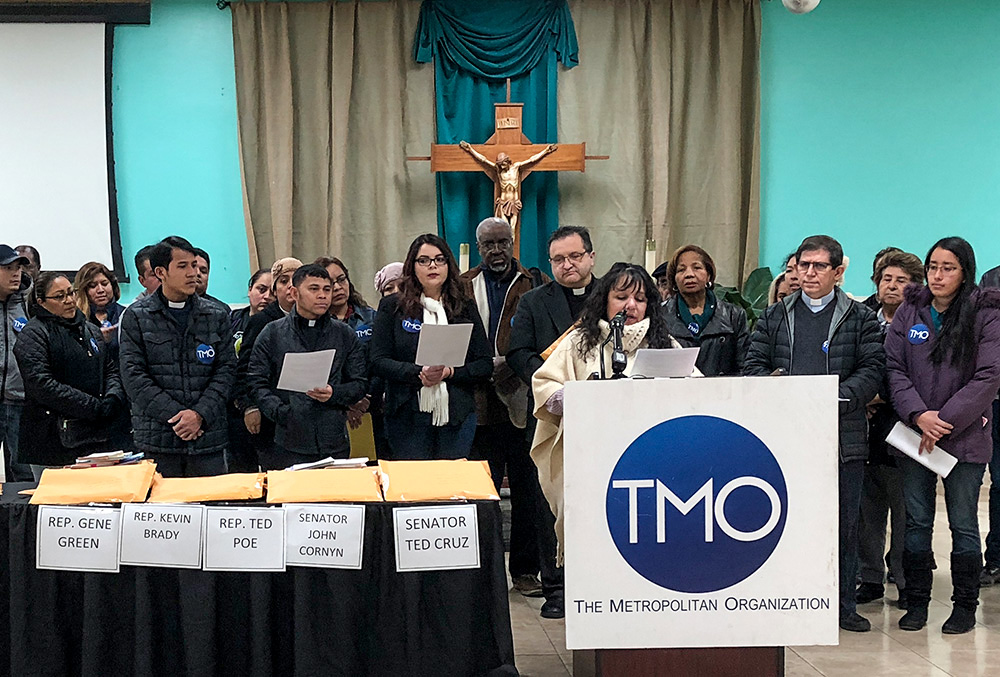
On Jan. 18, 2018, recipients of the Deferred Action for Childhood Arrivals program and their supporters, including clergy, participate in a news conference sponsored by The Metropolitan Organization at St. Leo the Great Catholic Church in Aldine, Texas. They gathered thousands of postcards to be mailed to congressional members urging they keep the DACA program intact. (CNS/Courtesy of TMO)
Since 1974, the Texas Industrial Areas Foundation (IAF) and its local affiliate organizations have worked to address issues such as infrastructure in underserved communities, public school funding, and workforce development and education programs.
Catholic bishops have supported the effort since its inception. And for its members and organizers, the work is perfectly aligned with Catholic social teaching.
"There are all kinds of ways to be Catholic," said Bob Fleming, a leader with Texas IAF affiliate The Metropolitan Organization (TMO) of Houston. "But when I worked with Catholic Charities, and when I worked with TMO, that's what I felt most Catholic."
Texas IAF began in San Antonio when Ernesto Cortés founded the first local affiliate, Communities Organized for Public Service (COPS). Before founding that group, Cortés trained with IAF organizers in Chicago.
A native San Antonian, Cortés implemented what he learned in Chicago when he returned to his hometown. With the blessing of local bishops, Cortés and his team recruited local parishes as some of his group's first member organizations.
Advertisement
COPS scored an early victory when it helped bring proper drainage to San Antonio's West Side, minimizing drownings and property damage during flash floods.
The success in San Antonio led to the formation of Texas IAF affiliates in Houston, El Paso, Dallas, Austin and the Rio Grande Valley. Issues like public school funding and the lack of infrastructure in unincorporated border colonias required statewide cooperation, further solidifying the unity of the statewide foundation.
The issues IAF organizations choose to tackle are not dictated by sensational news headlines or incendiary political rhetoric. Instead, these groups meet with community members and ask them what issues affect their day-to-day lives. According to Fleming, this simple approach of listening makes the foundation's work compatible with the Catholic faith.
"Catholic social teaching isn't ideological," Fleming said. "It says, 'Go out to the people, talk with them, understand them, let them tell you what's going on.' "
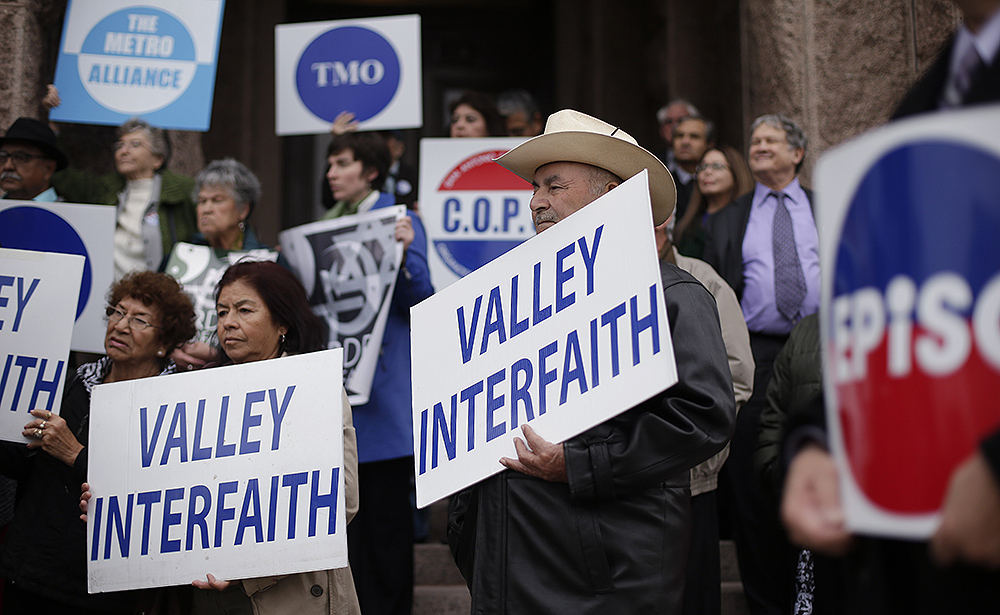
Supporters of Texas Industrial Areas Foundation affiliate groups gather on the steps of the Texas state capitol for a rally in support of Medicaid expansion, Wednesday, Feb. 20, 2013, in Austin. (AP/Eric Gay)
Fleming said during his time with The Metropolitan Organization, community members used different terms to describe the issues in their lives, but the themes remained consistent. People are typically worried about things like health care, education, the safety of their neighborhoods and earning a living wage. When directly asked what could improve their lives, people seldom discuss economic policy or other federal government issues. Instead, they tend to focus on the practical, tangible problems close at hand.
IAF organizations define themselves as "broad-based" rather than faith-based, and their work is focused on society, not just the church. However, the practice of utilizing parish networks in organizing efforts can also help bolster faith communities.
Divine Providence Sr. Pearl Ceasar has worked with the Communities Organized for Public Service for more than 40 years. When she started in 1976, Caesar worked at St. Alphonsus Catholic Church in San Antonio. At that time, the congregation was dwindling.
Ceasar conducted more than 100 individual meetings with parish families, asking about the issues affecting their lives. She said her meetings helped influence what issues COPS worked on and also reinvigorated the parish community. By 1978, more than 700 people attended Mass at St. Alphonsus every Sunday, she said.
"That gave me a new hope in the church," she said. "The church can be relevant and it is relevant in people's lives."
Ceasar shares Fleming's sentiment about the compatibility of Texas IAF's work and Catholic social teaching. In the 1960s, she studied the documents of the Second Vatican Council, which she said greatly impacted her outlook on the responsibilities of individual Catholics and the Catholic Church.
"Vatican II didn't address the doctrines of the church; it addressed the relationships in the church and who we are to be as Catholics," Ceasar said. "Meaning that we are to be engaged with people, we are to be engaged in the community."
Fleming said Texas' racial and ethnic diversity and its position as a border state make IAF and Catholic community engagement a vital necessity. Currently, Texas IAF is working with the Catholic Dioceses of Dallas and Brownsville and the Archdiocese of San Antonio* to issue parish photo ID cards to immigrants.
However, the state's political climate presents unique challenges that organizers in other states may not face.
Political scientists have long classified Texas as a limited government state, as opposed to other more public-service-oriented states. In Fleming's view, Texas' limited government is also an extractive one — meaning the Texas government extracts what it can from its citizens and natural resources without giving much in return.
Additionally, Fleming said minority communities have long been underrepresented in the Texas state government, leading to disparities in school funding, policing and necessities like drinking water and wastewater services. While Texas IAF has celebrated victories regarding these issues, Fleming said there is always more work.
"It's a constant fight in Texas," Fleming said. "To remind people that there's a common good we have to work towards."
He points to the Texas February 2021 power grid failure as a recent example of how the Texas government prioritizes the profits of corporations over the safety and well-being of its citizens.
Similarly, Texas state politicians passed legislation in 2023 that gives tax breaks to corporations relocating to Texas, which critics say robs certain school districts of adequate funding. Texas IAF staged protests denouncing this bill, HB 5, but Gov. Gregg Abbott signed it into law.
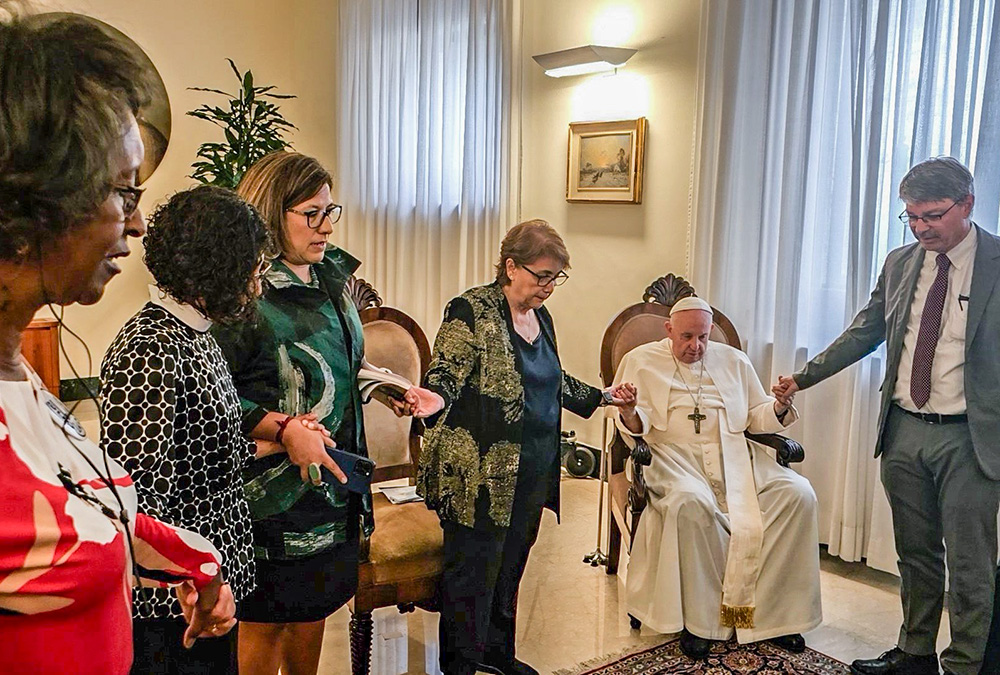
Pope Francis prays with delegates from community organizing groups that are affiliated with the West/Southwest Industrial Areas Foundation, which includes Texas IAF, after a private meeting in his Vatican residence, the Domus Sanctae Marthae, Sept. 14, 2023. (CNS/Courtesy of West/Southwest Industrial Areas Foundation)
Joe Rubio, co-director of the West/Southwest IAF region, also sees growing income disparity as an ongoing challenge for IAF organizations. Inflation in home prices, health care and higher education makes the Texas IAF's living wage and workforce development campaigns all the more necessary, he said.
While these issues may seem insurmountable at times, foundation leaders have the encouragement of none other than Pope Francis to keep the wind in their sails. Rubio was among a group of their organizers and leaders who traveled to the Vatican in 2022 and 2023 for conversations with the pope about their work.
Rubio said Francis was immediately impressed by the "concrete" nature of IAF organizing during the initial meeting. The pope liked that the IAF is not informed by theory or academia but takes its direction from practical conversations with everyday people, Rubio said.
Rubio said the pontiff compared the IAF's work to a stream of water. The meetings with community members are like individual drops. Eventually, the drops converge and create an unstoppable stream.
*This article has been edited to correct an incomplete list of dioceses.

